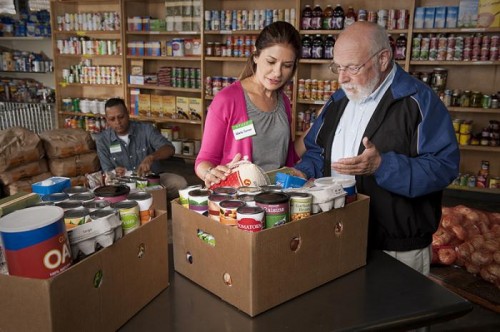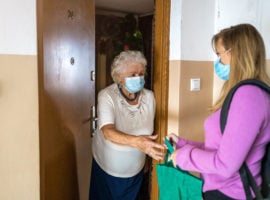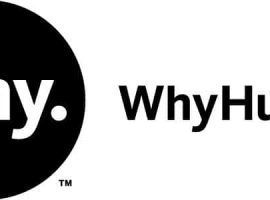 In the last few months, the staff of WhyHunger’s National Hunger Clearinghouse has been on a tour of emergency food providers (EFPs — such as food banks or soup kitchens) in New Jersey. The visits are part of an exciting new capacity building project we’re piloting, called Nourishing Connections. Nourishing Connections aims to connect EFPs to resources and connect like-minded organizations to each other to foster shared learning. Nourishing Connections will also identify and showcase current and emerging leaders in the emergency food world who are challenging and changing the role EFPs play in efforts to end hunger, and connect them with the broader food justice movement.
In the last few months, the staff of WhyHunger’s National Hunger Clearinghouse has been on a tour of emergency food providers (EFPs — such as food banks or soup kitchens) in New Jersey. The visits are part of an exciting new capacity building project we’re piloting, called Nourishing Connections. Nourishing Connections aims to connect EFPs to resources and connect like-minded organizations to each other to foster shared learning. Nourishing Connections will also identify and showcase current and emerging leaders in the emergency food world who are challenging and changing the role EFPs play in efforts to end hunger, and connect them with the broader food justice movement.
WhyHunger is piloting Nourishing Connections in the tri-state area of New York, New Jersey and Connecticut. The first part of the year has had us visiting the Garden State to get a snapshot of the great work happening there.
Like all emergency food providers in the past several years, New Jersey EFPs have seen an increase in clients due to the recession. The arrival of Superstorm Sandy last fall only compounded the problem, increasing the number of people who rely on EFPs for food and other services. Despite extra demand, EFPs continue to serve their communities and continue to be at the forefront of disaster relief long after media attention has faded.
Food Bank of Monmouth and Ocean Counties When people think about Monmouth and Ocean counties, they often think of the Jersey Shore, fun and summer vacation. For clients of the Food Bank of Monmouth and Ocean Counties, summer time isn’t so much fun. Housing on the Shore is often rented to tourists at the highest possible price, leaving people who can’t afford vacation-rental prices with fewer housing options. As a result, people end up staying with friends, in shelters or living in their cars. The Food Bank of Monmouth and Ocean Counties (FBMOC) partners with local housing organizations to help clients locate housing and the food bank itself helps clients with utilities assistance. As part of an ongoing efforts to assist people affected by Sandy, FBMOC continues to make sure people get disaster relief by registering clients in a database that focuses on long-term recovery efforts and ensuring that people’s needs are matched with the resources available.
FBMOC conducts outreach and provides clients with assistance in applying for Medicaid, SNAP (formerly food stamps) and TANF throughout Monmouth and Ocean counties. FBMOC also addresses employment through a culinary arts job skills training program. FBMOC newest service is a program awarding capacity building grants to some of its 260 member agencies.

Center for Food Action As a member of the National Voluntary Organizations Active in Disaster, or VOAD, Center for Food Action (CFA) has been heavily involved in Sandy relief efforts since October, in addition to its regular services. CFA’s home of Bergen County has one of the leading VOAD groups in New Jersey, and CFA has been an active member, with services including feeding and relocating people, paying for storage and buying and replacing appliances for more than 4,000 NJ residents affected by Sandy.
CFA has been focused on Sandy recovery as part of a strategy of multi-faceted advocacy, particularly to ensure that New Jersey gets its fair share of recovery dollars from the federal government. CFA’s regular advocacy work ranges from personal advocacy for clients–to make sure they get benefits they are eligible for–to statewide efforts advocating for fair food policies like Universal School Breakfast. CFA is also committed to educating other EFPs about the benefits of doing advocacy work. Many EFPs feel they don’t have enough time to do advocacy work or that it is outside the scope of their mission. CFA’s perspective, instead, is that engaging in advocacy work improves EFPs’ ability to distribute food. The secret to getting EFPs on board: starting with baby steps and simple actions that raise the voices of clients — because their voices are the most powerful tool for advocacy.
CFA has an exceptionally diverse client base, and has adapted to meet their varied needs. CFA clients speak English, Spanish, Korean and Croatian; CFA has done outreach and recruited staff and volunteers who speak all of those languages. In response to increased diversity of clients’ dietary needs, CFA has risen to the challenge by providing options like kosher meals, diabetic food packages and culturally relevant foods.
Community Food Bank of New Jersey When you mention Community Food Bank of New Jersey (CFBNJ) in the tri-state area, folks have nothing but good things to say. It‘s a testament to the organization’s innovative work and the lasting partnerships.
CFBNJ has built a great relationship with America’s Grow a Row, a group who provides nutrition and food education for children on various farms across New Jersey. CFBNJ sends 500 to 600 children to Grow a Row farms every summer, where the kids to learn where their food comes from–get to bring home fresh produce they’ve harvested themselves. America’s Grow a Row has provided CFBNJ with 600,000 pounds of produce.
The CFBNJ Agency Relations Department is working to build partnership among their member agencies by forming coalitions. Agencies are grouped in coalition around a given topic in order to increase dialogue among them–in an effort to foster collaborative work and encourage shared service.
Understanding that hunger is a symptom of poverty and that food distribution is merely a stopgap effort that won’t solve the larger problem, CFBNJ works hundreds of with other organizations through the Anti-Poverty Network of New Jersey to address three poverty issues: hunger, housing and employment. As a part of the network, CFBNJ has met with local and state elected officials people to discuss how these issues fit together and advocate for larger change.
Through a WhyHunger partnership with HMS Host, these three groups received $10,000 this year. We look forward to continued engagement with these food banks through Nourishing Connections and other projects in the coming years.





